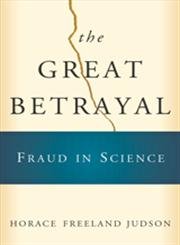The Great Betrayal: Fraud in Science
Judson, Horace Freeland
About the Book
Description:
Pages can have notes/highlighting. Spine may show signs of wear. ~ ThriftBooks: Read More, Spend Less 0.6. Seller Inventory # G0151008779I3N00
About this title:
Synopsis: Fraud permeates all types of institutions today and now the world of science, the last bastion of respect and trust, is no exception. Dozens of cases have been uncovered in the past quarter-century-and the headlines continue. We can no longer shrug off fraud in science as the work of aberrant individual scientists, Horace Freeland Judson argues. Instead, we must look for its causes and its remedies in the structures and cultures of the scientific institutions themselves. Judson carefully details all types of scientific fraud and how they happen; considers the self-government of the sciences, including peer review and the refereeing of papers; and exposes the failures of academic, governmental, and legal responses. He also shows how the movement toward Internet publication of papers promises remarkable new checks on fraud and suggests how we can restore and defend the integrity of the greatest monument of human endeavor- the sciences.
Review: Horace Freeland Judson, author of The Eighth Day of Creation, eloquently examines the nature and causes of scientific fraud in The Great Betrayal. Although the process of science has built-in checks and balances such as peer review and paper refereeing, Judson calls these "moribund" and asks "whether in fact and to what extent science really is self-correcting." After all, success and good results are sometimes valued above all in science, especially by the agencies or corporations that provide the funding for research. Upon examining hundreds of cases of suspected scientific fraud, Judson answers blind praise of science's self-policing with the terse statement, "Their claims about science are unscientific."
To make his case, Judson begins with some of the giants of science: Mendel, Darwin, Pasteur, Freud. It turns out that each of these men fudged their data in one way or another, whether by omitting numbers that didn't fit desired results, or manipulating photographs, or not using experimental controls. Judson recognizes that there are difficulties in examining historical scientists' behavior through a modern lens, and he deals with the associated complexities by asking tough questions: What if their cheating led to a correct answer? Where is the line between intuition and lying?
The Great Betrayal goes on to describe enough modern cases of scientific fraud to leave readers reeling. The most damning revelations in the book are those showing how whistle-blowers are treated by the scientific establishment, and Judson's showcase for this is Margot O'Toole, who called for correction or retraction of a paper co-authored by noted biologist David Baltimore and was subsequently vilified for her actions. The so-called "Baltimore case" became one of the ugliest and most revealing controversies in late-20th-century science. In the end, Judson offers hope that science may become truly open through electronic publishing. Whether the free exchange of criticism offered by the Internet will refresh science remains to be seen, but without learning from its defects, Judson writes, this great endeavor will ultimately fail. --Therese Littleton
Bibliographic Details
Title: The Great Betrayal: Fraud in Science
Publisher: Houghton Mifflin
Publication Date: 2004
Binding: Hardcover
Condition: Good
Dust Jacket Condition: No Jacket
